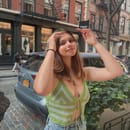As the leaves turn orange and fall to the man-made pavement and the air grows cold and nips at your skin, there is a sense of both beauty and sorrow that comes with the changing of the season. Fall rolling around, for me, means more time inside and reflecting on the fun I had in the warm sun. I tend to think about how I am simply a product of my environment for I have to bundle up with layers upon layers to even stand comfortably outside. Then I remember the poem I have read every fall since before I can remember, “The Hollow Men” by T.S. Eliot.
“The Hollow Men” is a reflection of the nature of shallowness through the comparison of a scarecrow to man. Split up into five parts, the poem looks at themes of emptiness, destruction, and the end of humankind itself. This poses the question if Eliot is speaking on the literal extinction of humans, or more likely the scarcity of true humanity within said humans. The poem begins “We are the hollow men / We are the stuffed men,” implying that the reader, the speaker, and surrounding bystanders are all part of a whole, a society of “hollow men” This metaphor itself is carried throughout the poem as to indicate a shell rather than any sort of sustenance. Eliot goes on to write “Our dried voices, when / We whisper together/ Are quiet and meaningless / As wind in dry grass,” referencing the lack of purpose behind the words spoken between people. I think that Eliot is referencing the notion that as more people grow to believe they are inherently always correct, their voices grow diluted by ignorance. With a brain and body made of straw, “the hollow men” are nothing other than what they are made by their environment to be, empty.
Eliot then goes on to describe the speaker’s fear of the eyes and the voices he encounters within his dreams and how he wishes to escape them. This is as if to say that the horrors of the real world are manifested in the unconscious. The speaker discusses “Such deliberate disguises / Rat’s coat, crowskin, crossed staves,” symbolic of disease and death. These represent the feelings brought to the speaker by “the hollow men.” Section three begins with “This is the dead land / This is cactus land,” talking about the state of the world being melancholy and the purpose of “the hollow men” being non-existent. In this section of the poem, Eliot begins to reveal the speaker’s reasons for believing that society has become so shallow as he says “Lips that would kiss / Form prayers to broken stone.” This line in itself discusses the speaker’s thoughts that human emotion and desires are outshined by the worship of broken idols. As the power of a human is directly correlated to the power of their ideas, one speaks and many others follow. Section four begins to paint an image of hopelessness as the speaker says “In the last of meeting places / we grope together,” alluding to a path of destruction yet a need for companionship.“Sightless, unless / The eyes reappear,” presumably the same eyes that the speaker was afraid of. The eyes represent the truth “the hollow men” can’t see or choose not to see.
The final section in the poem begins with an altered version of an old nursery rhyme “Here we go round the prickly pear/ Prickly pear prickly pear/ Here we go round the prickly pear/At five o’clock in the morning.” The alteration of the classic song “Here We Go Round the Mulberry Bush” is representative of a scene as hollow as the men existing in it. It brings light to the idea that though “the hollow men” provide very little purpose, they still have a direct influence on the world that they are inadvertently destroying. The entirety of the fifth and final section is powerful and completes the poem. There are many notable lines, too many to quote without including the entire section, but in summary, it outlines the downfall of all humankind knows. Eliot writes about the in-between of what people know and what they choose to believe and concludes that the speaker is aware of the mortality of his own life. Arguably though, the most powerful is the final stanza “This is the way the world ends / This is the way the world ends / This is the way the world ends / Not with a bang but with a whimper.” The world is not destroyed by any type of extremity, but with blind navigation by a purposeless and destructive kind of “hollow men.”
Though this poem is existential and gloomy, it piqued my interest at a very young age and still does to this day. Not only does it provide an amazing read for the season of fall where I feel as though it reflects the literal nature of the changing season, but it also gives me a lot to think about every time I sit and read it. I feel as if this poem has evolved with me over the years and as of this year, this is what I make of it. “The Hollow Men” by T.S. Eliot will always be a mandatory fall read for me.


